It is necessary to completely change the view of the European security architecture where Central Europe has a crucial role to play, said European Commission President Ursula von der Leyen at the 19th GLOBSEC security conference in Prague. The patron of GLOBSEC Prague 2024 – which took place under the motto “Taming the Storm” – was Petr Pavel, the President of Czechia.
Central Europe is Leading the Way
Besides the Czech president, the other big name and keynote speaker was newly re-elected President of the European Commission Ursula von der Leyen. According to von der Leyen
“Central Europe is the heart of Europe.”
Therefore, she said, it is necessary to completely change the view of the European security architecture. Where Central Europe has a crucial role to play. “Only then will it be possible to achieve real peace. We must have the means to deter any aggression. In the next European Commission, I will create the post of Commissioner for Defence,” declared von der Leyen.
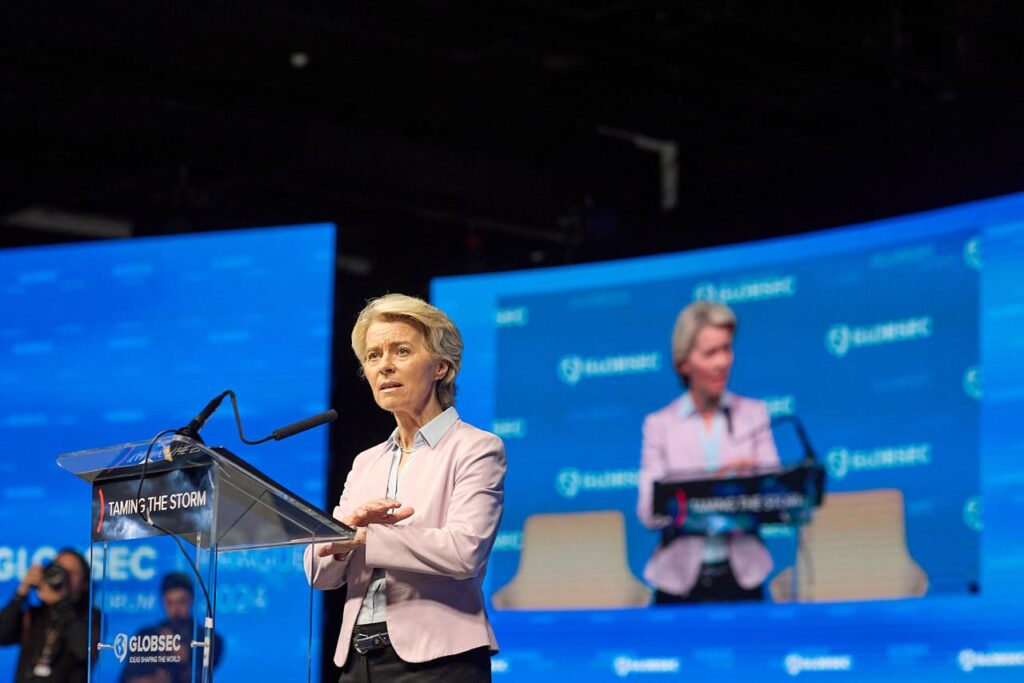
Ursula von der Leyen at the GLOBSEC Forum 2024 in Prague, Czechia (Photo: GLOBSEC)
The forum was officially opened by the founder and president of GLOBSEC, Róbert Vass. He expressed his optimism about shaping the future, emphasizing that with 2000 people gathered in Prague, they have the power to steer the world in the midst of the growing storm, reminding everyone that “history sometimes needs a little push.” In his speech, he addressed the challenges of the future, emphasizing the need to tame the ever-growing storm and celebrating Europe’s contributions to democracy and international order.
A new GLOBSEC initiative called the GeoTech Center, based in Washington, was also launched during the conference.
Led by US General John Allen, it aims to more effectively connect policy and technology leaders in Europe and the United States. It aims to create a network of technology experts, policy-makers, and others to bring Europe and the United States closer together in their approach to the use of modern technologies while laying the groundwork for an ongoing discussion of the security implications of new technologies.
The center was supported by Microsoft President Brad Smith, who announced in a discussion that the company would provide US$3 million to support the center over the next three years. Pavel said he hoped that representatives from Japan, South Korea, Australia, New Zealand, and possibly Israel would join the initiative.
GeoTech – A New Tool for Democracies to Counter their Enemies?
The focus of the “Futureproofing Europe” panel at the GLOBSEC forum was on the critical role of technology in shaping Europe’s future and maintaining its global influence. The speakers were Petr Pavel, President of the Czech Republic Brad Smith, Vice Chair & President, Microsoft, Nataša Pirc Musar, President of the Republic of Slovenia and Kersti Kaljulaid, former President of Estonia and Member of the Board of Directors, GLOBSEC.
John Allen, former Four-star General of the US Marine Corps and retired Commander of the NATO International Security Assistance Force, was the event’s moderator. He opened the debate by outlining the importance of technology in geopolitics.
“The very reason that GLOBSEC has created the Geotech Center to address the daunting challenges that we (the West – the editor) are going to face going forward,” the general also added that “a ‘United Democratic Front’ that technologically advanced is good for humankind, good for the world.”
“There is no doubt, that the current international as well as the security environment is driven by competition between democracies and different kinds of autocracies. Then, somewhere in the middle, we’ll have quite a large group of countries that are undecided about which way to go.” Czech President Petr Pavel reminded.
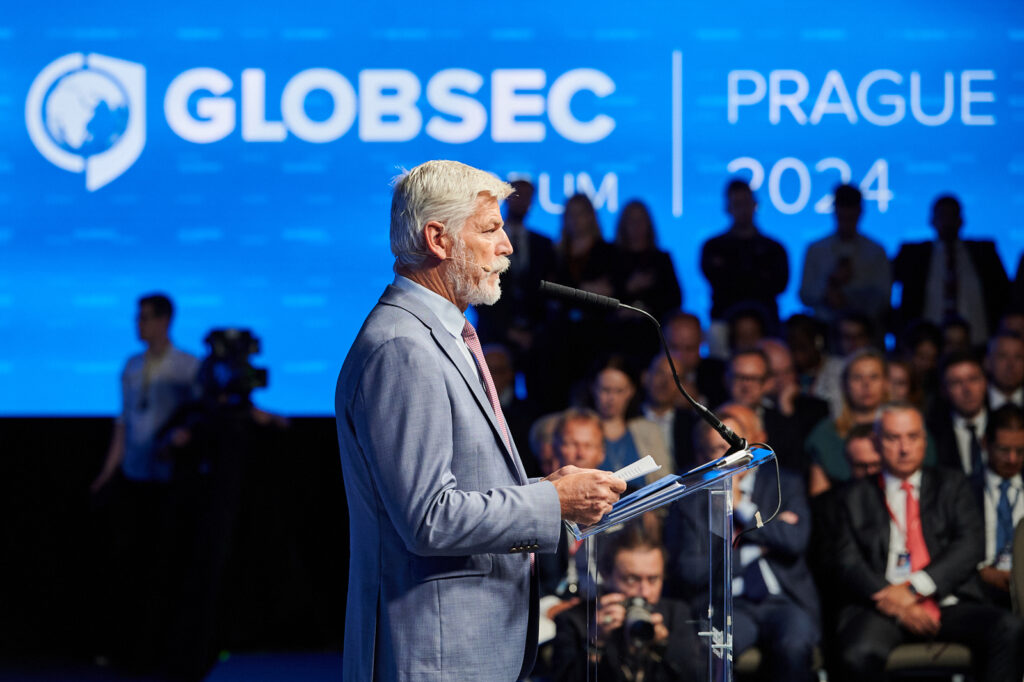
President of Czechia Petr Pavel at the GLOBSEC Forum 2024 in Prague, Czechia (Photo: GLOBSEC)
They have pragmatic cooperation with some of the autocratic regimes, probably out of frustration with the inability or unwillingness of the democratic states to cooperate more deeply, and at the same time, are influenced by propaganda that portrays democracy as a system that will fail, he stated.
The president added that technology is and always has been a tool of power, and whoever achieves a major technological breakthrough will have a great advantage in promoting their value system. All democratic countries, he said, must ensure that technology is used to promote democratic values and is not misused by those who want to exercise greater control over their citizens and use it to dominate them militarily, for example. The Czech President highlighted the importance of private companies that must lead and allocate resources to drive technological innovations.
As the GLOBSEC Forum approaches, the focus sharpens on the pivotal role of GeoTech in shaping our world. 🌍
Key topics like cyber adaptation, AI, and private-public sector collaboration are at the forefront.
Stay tuned as we explore what truly anchors the geotechnical frontier.… pic.twitter.com/qbyHCFGVHp— GLOBSEC (@GLOBSEC) August 28, 2024
The moderator asked Brad Smith how he would describe the Global Tech competition as it looks today and how he would see it evolving over the next decade.
In his response, the Vice Chair and President of Microsoft elaborated that
Europe’s biggest challenge – a global one – is balancing the protection of core values with the rapid advancement of technology.
Smith also pointed out that Microsoft chose a different route ten years ago, which put the enterprise on a completely different path. Instead of following their competitors like Samsung and Apple, who then created “great phones,” they decided to invest in cloud systems and in the areas where they’re “doing great.” Thus, they got their technology on everybody’s phones, which taught them the following lesson: “Never spend so much time focused on what you don’t have that you forget all of your strengths. We are forgetting for example, that arguably the greatest technological advance of this decade in part came from Europe in creating a cure or a vaccine to end the pandemic.”
The vice chair and president also emphasized that AI is a new general-purpose technology that will reshape every part of the economy, and it has a great impact on the competition between countries for general-purpose technology.
Former Estonian President Kersti Kaljulaid pointed out the dual-edged nature of technological advancements, stating that tech can be put to both good and bad use. She also stressed the need for a balanced approach to regulation, warning against overreach that could stifle innovation or cooperation, particularly with global partners.
The panel also addressed the critical issue of defense technology. Brad Smit emphasized the need for faster procurement and effective collaboration. Without it, we won´t be successful in defending ourselves.
Slovenian President Nataša Pirc Musar highlighted the relationship with China. She emphasized that we need to define a strategy that balances competition and cooperation with China. The EU must strengthen itself internally, ensure fair competition, and continue investing in science and innovation. She also emphasized the need to invest in the development of advanced technologies and digital competences.
“If we want to increase our economic competitiveness and preserve our social model, we must cooperate more closely within the EU and with partners on the international scene,” she added.
Reflecting on the intersection of technology, democracy, and global partnerships, the panelists agreed on a need to create a regulatory environment that preserves European values without hindering progress.
Winter is Coming, but is the West Ready?
The conflict in Ukraine has forced NATO to strengthen its presence on its Eastern Flanks. What further steps are needed to ensure swift and effective collective defence for NATO? How can NATO enhance crisis response through infrastructure investment, equipment standardization, and training? These were the main questions of the panel, Winter is Coming: NATO and New Security Frontiers, led by Patrick Tucker, the Technology Editor of Defense One.
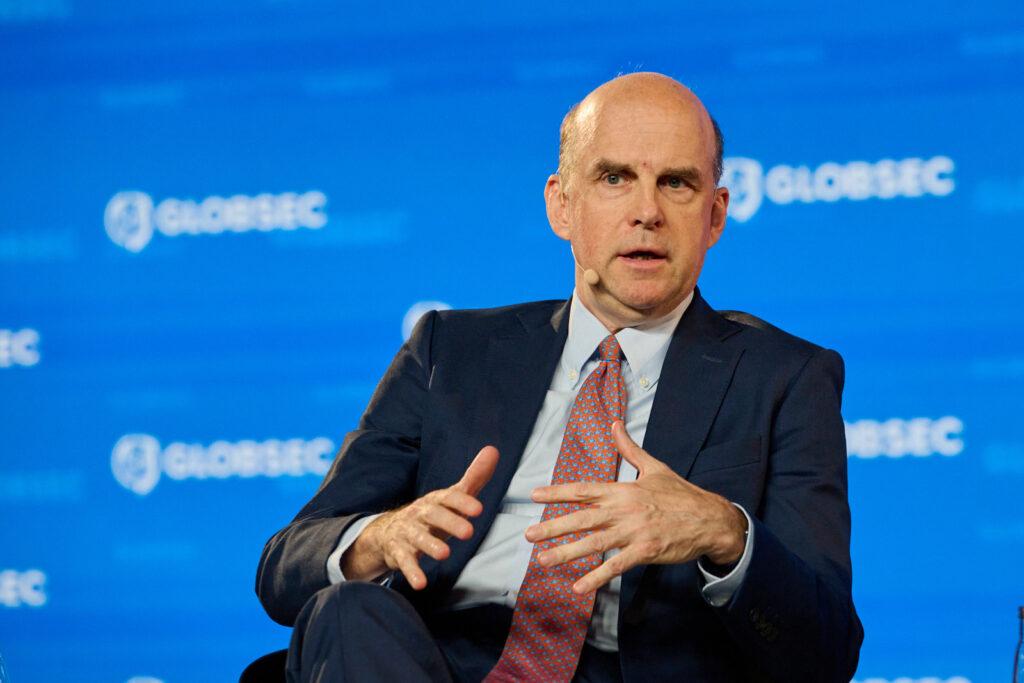
NATO’s Assistant Secretary-General for Defence Policy Angus Lapsley speaking at GLOBSEC Forum 2024 in Prague, Czechia (Photo: GLOBSEC)
According to Tucker, it is important to point out that the conference focuses on many dire threats. He also highlighted that this year, for the first time, a majority of NATO members have reached their 2 percent defense spending burden, and with the addition of two new members, Finland and Sweden. NATO also established its Ukraine Command center in Germany.
“NATO is larger than it ever has. It has new strategic plans and concepts to centralize operations and reinforce the Eastern Flank. (…) Because the threat is as real as ever, so good news meets some serious concerns,”
the editor of Defense One said.
General Philip Breedlove, the retired NATO Supreme Allied Commander Europe, started the conversation by warning about the lack of a policy for victory in Ukraine.
“The biggest challenge right now is not strategy. It’s policy. It’s policy-makers who are making the decisions to take the actions that we need to take in Ukraine. In the United States, we do not define our policy about winning in Ukraine,” the Commander reminded.
He also emphasizes that the US gives Ukrainians everything they need as long as it takes. But Washington doesn’t say it “to do what to win and expel Russia from Ukraine,” said the general. According to him that is a problem because the West needs a policy and strategy for that.
Hanno Pevkur, Estonia’s Minister of Defence, voiced concerns over the weakening European military strategy, stressing the need for fairness in defense efforts.
“When we come to the strategy, there is an understanding of what Ukrainians have to do and what they are capable of doing.
The question for us as policy-makers is very simple, do we want Ukraine to fight, or do we want Ukraine to win? When we decide we want Ukraine to win, then we have the next steps,” the minister reflected to the previous speaker.
As for the next steps, the Estonian Minister of Defense came out with the victory strategy for Ukraine last November. They made it clear in that document they want Ukraine to win this war not to fight. According to Hano Pevkur, “(…) we need to make a long-term decision in each country in the West should spend 0.25 percent of their GDP on helping Ukraine.”
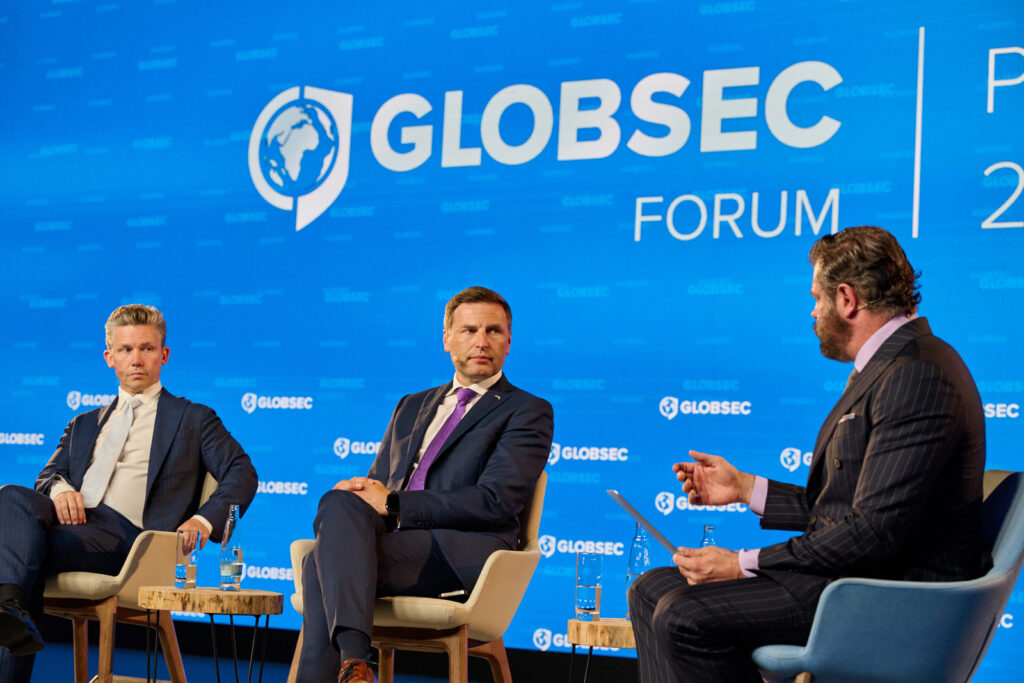
Swedish and Estonian Defence Ministers, Pal Jonson and Hanno Pevkur at GLOBSEC Forum 2024 in Prague, Czechia (Photo: GLOBSEC)
“I’m sorry but we’re not giving Ukraine everything that they need. And the limitations…they are stupid. (…) This puts Ukrainians to fight with one hand behind the back,” he stressed.
Pal Jonson, Sweden’s Minister of Defence, pointed out the strategic benefits of Sweden and Finland joining NATO, strengthening the Alliance’s northern defense and enhancing Arctic capabilities. “We [Sweden] offer a broad ecosystem as a smaller country in the alliance. The Swedish territory provides the alliance with operational depth; we have strong capabilities in the Baltic seas, arctic capabilities, and a quite strong intelligence community also on Russia.”
Adding to that Anders Carp, Deputy CEO of Saab, highlighted the crucial role of reliable defense technologies. The panel also addressed the growing threat of hybrid warfare, with Patrick Tucker and Philip Breedlove emphasizing Russia’s cyberattacks and information warfare as crucial challenges.
Prague to Host Next Edition of GLOBSEC Forum
After three days of a massive number of sessions (around 100) and with more than 2300 participants and 200 speakers from up to 80 countries, this year’s GLOBSEC Forum officially ended.
While a wide number of world statesmen came to Prague, there was no representation of the Slovak government in the Czech capital. No high-ranking officials were sent to the conference by either the Hungarian or Polish governments. The absence of Slovak decision-makers can be explained by the fact that the Bratislava-based think-tank is facing attacks mainly from representatives of the governing Smer and SNS. Although, Prime Minister Robert Fico has participated in GLOBSEC several times in the past and considered it a diplomatic success for Slovakia.
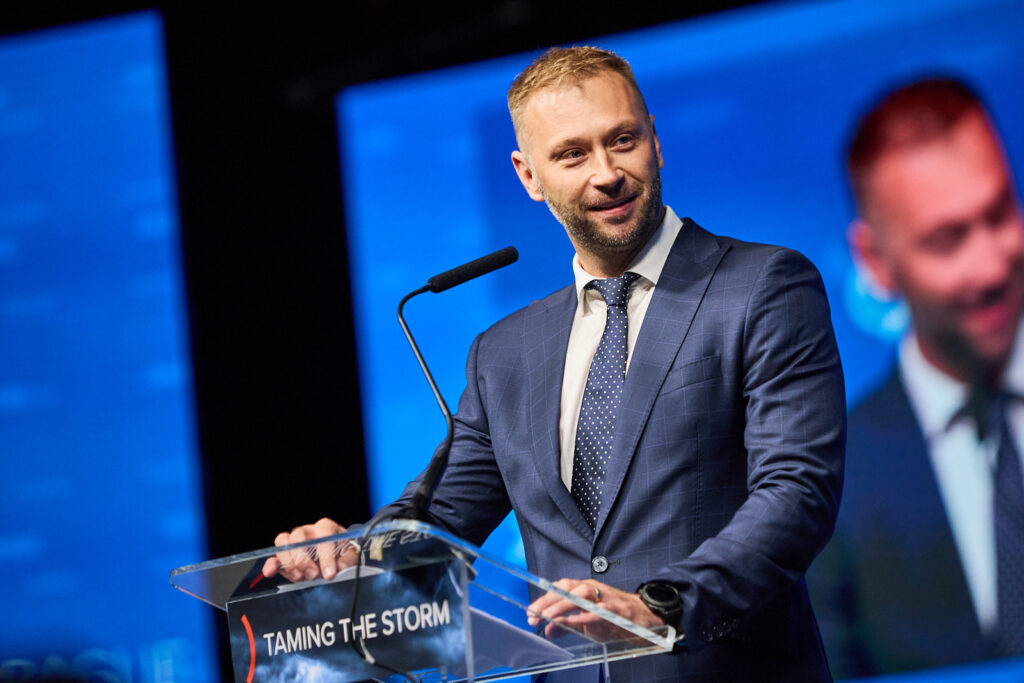
Founder and President of GLOBSEC Robert Vass (Photo: GLOBSEC)
In the closing press briefing, Robert Vass announced
the three main outcomes of the conference: first one is the critical importance of Central and Eastern Europe in charting the EU’s future; number two, the necessity of GLOBSEC Geotech Center to Champion Europe’s efforts to harness emerging Technologies and number three, implementing the key priorities for the EU’s new leadership.
In response to The Long Brief’s question about the long-term ambition of the conference to present itself as Central European cooperation, Wilhelm Molterer, the Chairman of GLOBSEC Board of Directors and former Vice Chancellor of Austria, responded that everybody realizes how important this regional cooperation is.
“This regional cooperation is growing beyond Central Europe. And the phrase what was used by von der Leyeng saying: »Central Europe is central for Europe«. We think this is the proper description. We have also realized that we should go to the Black Sea and even beyond to the Middle East. That’s exactly the level of ambition we have as GLOBSEC. We are offering this platform for that, this type of substance and type of geographical scope where democracy, freedom, prosperity, and peace are the most welcome”, concluded Wilhelm Molterer.
Since next year is the 20th anniversary of the forum, the organizers like to make it a special year. “We will be striving for leaders from G7 countries from key international institutions on the highest level,” the GLOBSEC president stated.
If you would like to have more insight of the conference, watch the recap video here.

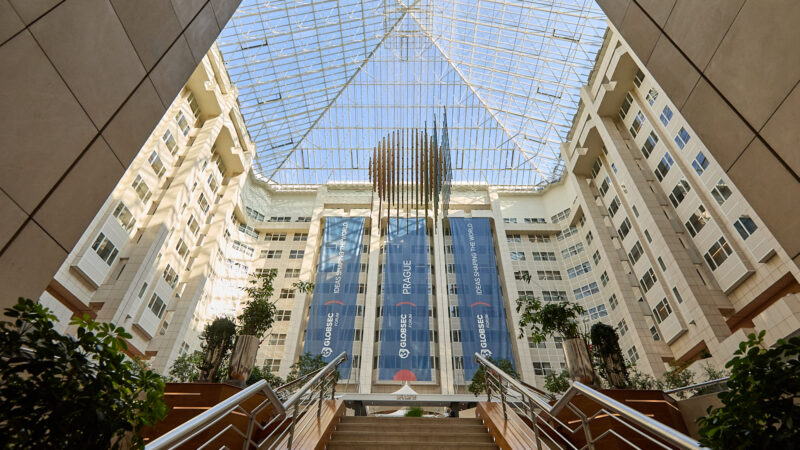
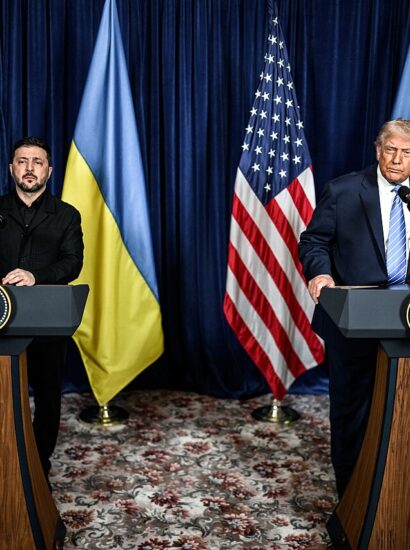
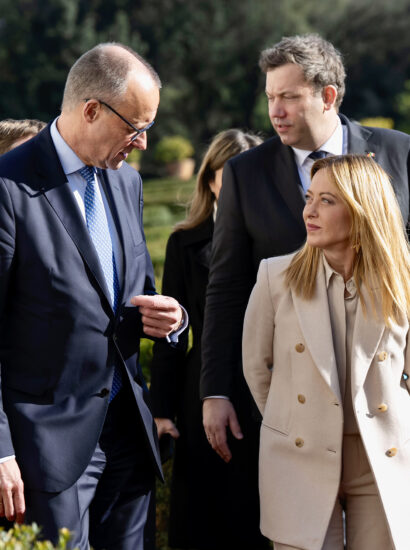
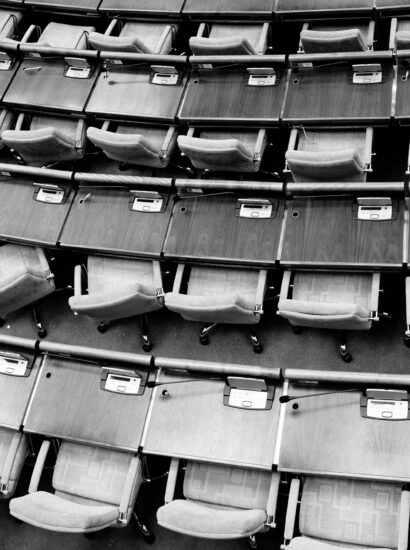
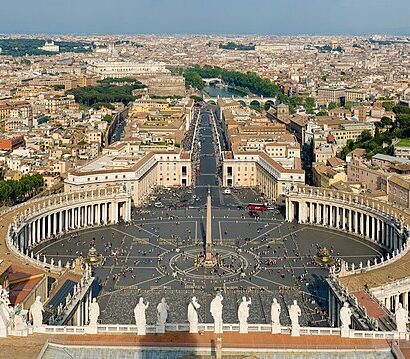


[…] the latest GLOBSEC event, we had the privilege to sit down with Dr Bryce Wakefield, a well-known Indo-Pacific expert. Dr […]